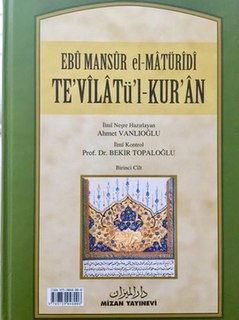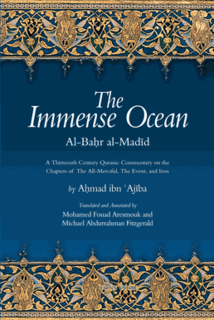
The Quran, also romanized Qur'an or Koran, is the central religious text of Islam, believed by Muslims to be a revelation from God (Allah). It is widely regarded as the finest work in classical Arabic literature. It is organized in 114 chapters, which consist of verses.

Tafsir refers to exegesis, usually of the Quran. An author of a tafsir is a mufassir. A Quranic tafsir attempts to provide elucidation, explanation, interpretation, context or commentary for clear understanding and conviction of God's will.
Abū Muhammad Abd-Allāh ibn Muslim ibn Qutayba al-Dīnawarī al-Marwazī or simply Ibn Qutaybah was an Islamic scholar of Persian origin. He served as a judge during the Abbasid Caliphate, but was best known for his contributions to Arabic literature. He was a polymath who wrote on diverse subjects, such as Qur'anic exegesis, hadith, theology, philosophy, law and jurisprudence, grammar, philology, history, astronomy, agriculture and botany.
Mafatih al-Ghayb, usually known as al-Tafsir al-Kabir, is a classical Islamic tafsir book, written by the twelfth-century Persian Islamic theologian and philosopher, Fakhruddin Razi (d.1210). The book is an exegesis and commentary on the Qur'an. At 32 volumes, it is even larger than the 28-volume Tafsir al-Tabari. It is not unusual for modern works to use it as a reference.
One of [his] major concerns was the self-sufficiency of the intellect. [...] [He] believed [that] proofs based on tradition (hadith) could never lead to certainty (yaqin) but only to presumption (zann), a key distinction in Islamic thought. [...] [However] his acknowledgement of the primacy of the Qur'an grew with his years. [...] [Al-Razi's rationalism] undoubtedly holds an important place in the debate in the Islamic tradition on the harmonization of reason and revelation. In his later years, he also showed interest in mysticism, although this never formed a significant part of his thought.
Pesantren or Pondok Pesantren are Islamic boarding schools in Indonesia. They consist of pondok, mosque, santri, teaching of classical Islamic texts and Kyai. According to one popular tradition, the pesantren education system originated from traditional Javanese pondokan; dormitories; ashram for Hindu or viharas for Buddhists to learn religious philosophies, martial arts and meditation. Institutions much like them are found across the Islamic world and are called pondok in Malaysia and Southern Thailand and madrasa Islamia in India and Pakistan and much of the Arabic speaking world. Pesantren aim to deepen knowledge of the Qurʾān, particularly through the study of Arabic, traditions of exegesis, the Sayings of the Prophet, law and logic. The term pesantren derives from the root word santri or student -- pe-santri-an or the place of the santri

A kyai is an expert in Islam, usually used among the ethnic Javanese people.
Pondok Pesantren Walibarokah Burengan Banjaran Kediri is a pesantren located in Kediri, East Java. Run by the Wali Barokah Foundation, the school was founded in 1950 by Nurhasan Al Ubaidah, who wanted to teach Islam to help Indonesia achieve a just and prosperous society both materially, spiritually and morally.

Anwar al-Tanzil wa-Asrar al-Ta'wil, better known as Tafsir al-Baydawi, is one of the most popular classical Sunni Qur'anic interpretational works (tafsir) composed by the 13th-century Muslim scholar al-Baydawi (d.1319), flourished especially among non-Arab Muslim regions.

Muhammad Quraish Shihab ; February 16, 1944) is an Arab Indonesian Muslim scholar in the sciences of the Qur'an, an author, a cleric, and former Minister of Religious Affairs in the Cabinet of Development VII (1998). He is the older brother of the former Coordinating Minister for People's Welfare, Alwi Shihab.

Tafsir al-Tahrir wa'l-Tanwir is a work of Qur'anic exegesis (tafsir) by Muhammad al-Tahir ibn Ashur, the contemporary Islamic scholar graduated from the University of Ez-Zitouna and the major figure within the Islamic Modernism movement. The book is a culmination of his fifty years of work, and ibn Ashur poured in all of his innovative and reformist approaches toward hermeneutical engagement. His approach is most notably characterized by his emphasis on the rhetorical aspect of the Qur'an, instead of relying completely on traditional interpretational science (riwaya) employed by other mufassirs whom ibn Ashur criticized. Ibn Ashur criticized the methodology that relies on the opinions by their predecessors without adding little scientific values, by attacking how people are delusional in concerning about the contradictions between the divine message and traditions. The book was published in 1984 through Tunisian House of Publication, consisted of 30 volumes, and considered one of the most important contemporary Qur'anic exegesis to this day.
Pondok Modern Darussalam Gontor Ponorogo, also known as Pondok Modern Gontor, or abbreviated as PMDG, or simply Pesantren Gontor, is a pesantren in Ponorogo Regency, East Java, Indonesia. Since its founding in 1926, the pesantren has become famous for the application of discipline, heavy emphasis of foreign languages, and strong network and cadre of alumni. It also has been an educational institution known for not specifically tied to any political and social organization. The pesantren is considered a backbone of Muslim society in Indonesia, producing numerous leading figures of the history of Islam in Indonesia.

Maulana Al-Habib Muhammad Luthfi bin Ali bin Yahya, colloquially known as Habib Luthfi, is an Arab Indonesian Islamic sheikh, kyai and preacher from Pekalongan, Central Java, who has served as a member of the Indonesian Presidential Advisory Council since December 2019.
Ismail al-Khalidi al-Minangkabawi was an Islamic scholar belonged to Khalidiyya branch of Naqshbandi tariqa in the 18th to 19th century, hailed from today's Tanah Datar Regency, West Sumatra. He is regarded as the pioneer of the tariqa in Minangkabau region, as well as the whole Indonesian archipelago. He was also known as a scholar of Islamic jurisprudence, kalam theology and tasawwuf.
Burhanuddin Ulakan Pariaman, also known as Sheikh Burhanuddin Ulakan, was an Islamic cleric (ulama) from the Minangkabau region. He is regarded as the pioneer of Islamic propagators in West Sumatra. He is also known as a commanding figure of the Islamic movements against the Dutch colonization. Regarding his Islamic belief, he was a Sufi murshid belonging to the Shattari tariqa based in Minangkabau region.
Traditionalism or traditionalist Islam, in the context of Muslim society in Indonesia, refers to a religious strand which puts emphasis on preserving traditionally established local rituals and scholarship. Traditionalist Muslims refer to themselves as ahlusunnah wal jamaah or aswaja. Traditionalism is often contrasted with modernism, which is inspired by modernity and rationalism. Traditionalism has been the most adhered Muslim religious orientation in the history of contemporary Muslim Indonesia. The extent of traditionalism widely overlaps with the influence of a socio-religious organization Nahdlatul Ulama, the biggest Muslim organization in Indonesia. Traditionalism is also a critical element within the Muslim intellectual movement known as Islam Nusantara.

Abuya Kyai Hajji Ahmad Muhtadi bin Dimyathi al-Bantani or better known as Abuya Muhtadi is an influential Indonesian Muslim cleric from Banten. He is known as one of the Muslim scholars close to President Joko Widodo. At the Zikir Kebangsaan which was first held by the Indonesian government in the Merdeka Palace in 2017, Muhtadi was one of the religious leaders invited by the president. In the 2019 Indonesian presidential election, he supported a friend who was also a Muslim cleric from Banten, Ma'ruf Amin, who became the running mate of incumbent presidential candidate, Joko Widodo. Even so, in the 2014 Indonesian presidential election, he supported Prabowo Subianto as a candidate for Indonesian President and instructed his students to vote for Subianto.

Kyai Hajji Zubair Dahlan was an Indonesian ulama of tafsir, fiqh, uṣūl al-fiqh, and tasawwuf from Rembang Regency, Central Java. Every year, in the month of Ramadan, Zubair always routinely teaches the Tafsir al-Jalalayn to his students. In addition, he also active in teaching branches of Arabic grammar and tawhid at the Pesantren Sarang. Zubair is the father of an influential cleric in Indonesia, Maimun Zubair, and a teacher of several Nahdlatul Ulama cleric such as Sahal Mahfudz, Bisri Syansuri, and others. Some of his students later became caregivers and leaders of famous pesantren in Indonesia, such as Pondok Pesantren Lirboyo, Pondok Pesantren Sidogiri, Pondok Pesantren Al-Falah Ploso, Pondok Pesantren Mranggen, and other pesantren.

Ta'wilat Ahl al-Sunnah or Ta'wilat al-Qur'an, better known as Tafsir al-Maturidi, is a classical Sunni tafsir, written by the Hanafi scholar Abu Mansur al-Maturidi, who was a contemporary of al-Tabari.

Al-Bahr al-Madeed fi Tafsir al-Qur'an al-Majeed or shortly named al-Baḥr al-Madīd, better known as Tafsir Ibn 'Ajiba, is a Sunni Sufi tafsir work, authored by the Maliki-Ash'ari scholar Ahmad ibn 'Ajiba, who was following the Shadhili-Darqawi order.












